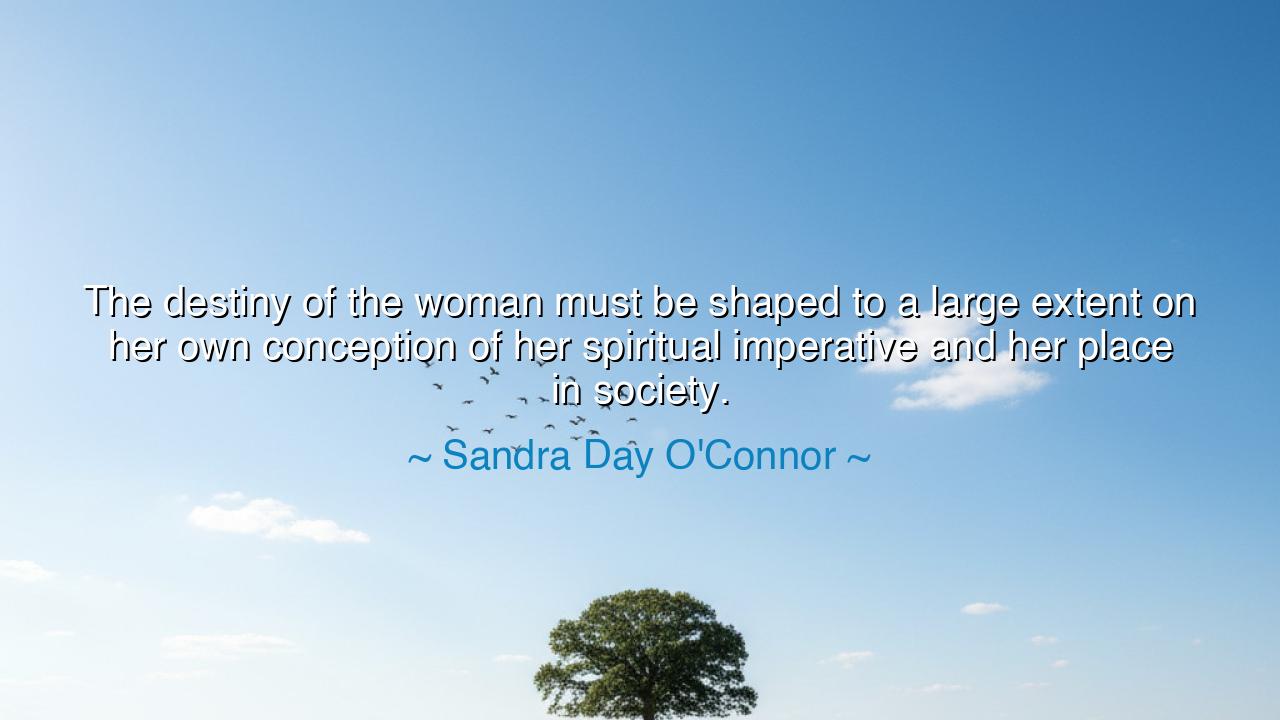
The destiny of the woman must be shaped to a large extent on her
The destiny of the woman must be shaped to a large extent on her own conception of her spiritual imperative and her place in society.






The words of Sandra Day O’Connor, “The destiny of the woman must be shaped to a large extent on her own conception of her spiritual imperative and her place in society,” sound like a clarion call across the ages. Spoken by the first woman ever to sit upon the Supreme Court of the United States, these words carry not only the authority of a judge, but the wisdom of one who walked a path few before her dared to tread. O’Connor reminds us that the fate of women cannot be written by others, cannot be chained by tradition or dictated by law alone. A woman’s destiny must be forged from within—rooted in her own sense of purpose, her spiritual imperative, and her chosen role in the great weave of society.
The origin of this truth is found in O’Connor’s own life. Born in an era when women were seldom seen in positions of high authority, she carved her way through barriers, graduating near the top of her class in law school only to find doors closed to her because of her gender. Yet she persevered. She became not only a lawyer and legislator, but a justice on the nation’s highest court. Her own destiny was not defined by others, but by the vision she held for herself. In this, she became a living embodiment of her words: a woman who listened to her own inner calling and insisted upon her rightful place in the order of society.
History, too, tells us stories that echo O’Connor’s insight. Consider Joan of Arc, a peasant girl who, believing she was called by God, took command of armies and shifted the fate of France. Her spiritual imperative was ridiculed by some, condemned by others, yet it drove her to a destiny that no ruler or cleric could have written for her. Or look to Sojourner Truth, who, though born enslaved, claimed her own place in society as a preacher and abolitionist. Her famous cry, “Ain’t I a woman?” was both question and thunderbolt, a demand that women define themselves not by chains but by their own inner vision. These women, like O’Connor, proved that destiny is not gifted—it is claimed.
The meaning of O’Connor’s teaching is profound. She reminds us that true empowerment begins within. A woman cannot merely wait for society to hand her her role, nor accept only what others say she may be. She must look within to her spiritual imperative, that deep sense of calling, dignity, and worth that transcends laws and customs. Once she knows this, her path—whether in home, in work, in art, or in governance—becomes her own, and she walks it with strength. Society may resist, but society cannot silence one who knows her place and claims it with conviction.
But O’Connor’s words are not only for women; they are for all. For the health of society itself depends on whether women are free to shape their own destinies. When they are silenced, society is crippled, limping with only half its strength. When they rise in their full dignity, society is enriched, drawing from the wisdom, creativity, and courage of all its members. Her words thus remind us that the liberation of women is not only justice for women—it is the flourishing of the entire community.
The lesson is clear: each person, and especially each woman, must dare to ask herself—what is my spiritual imperative? What is my true calling, beyond the expectations of others? Once discovered, she must honor it, even if the world resists. Families, schools, and communities must encourage this discovery, not suppress it. And society must open its gates so that every woman may step into the destiny she herself has envisioned, not the one prescribed by tradition alone.
Practical actions arise naturally. Parents must teach daughters that their worth is not measured by conformity, but by character and courage. Leaders must create opportunities for women to serve in every field, from science to law to governance. Women themselves must support one another, building networks of solidarity that make the burdens lighter and the paths straighter. And each person must listen to the voices of women with respect, recognizing in them the bearers of wisdom and shapers of society’s destiny.
Thus let Sandra Day O’Connor’s words endure as both wisdom and challenge: the destiny of women belongs not to others, but to themselves. It is shaped by their own vision of their calling, and by the place they claim in society. Let no one diminish that right, and let no woman forsake it. For in every woman’s courage to define her destiny, the whole of humanity rises, stronger, freer, and more whole.






AAdministratorAdministrator
Welcome, honored guests. Please leave a comment, we will respond soon